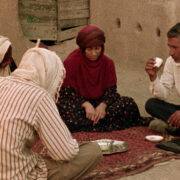BFI London Film Festival 2019, The Final Days: Some End Of The Fest Recommendations

Alistair is a 25 year old writer based in Cambridge.…
And just like that, LFF is over for another year. Thank you to everybody who has read our reviews during the fest – here are the final takes from the Film Inquiry team.
Ema (Pablo Larraín)
Paddy Wilson: Pablo Larraín‘s Ema opens on a traffic light, high above a calm Chilean street, burning. It’s been set alight by Mariana Di Golarmo‘s titular protagonist and it is the film in microcosm: Ema, faced with a system that won’t let her get what she wants, is going to burn it down. Seeing the green light, Larrain takes Guillermo Calderón and Alejandro Moreno‘s clever script and steps on the proverbial accelerator.
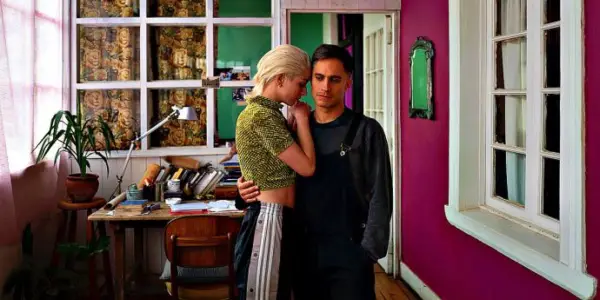
Ema, a dancer within a modern Chilean troupe, and choreographer husband Gastón (Gael García Bernal, with the freshest of trims), are blaming one another for their offscreen aberration – returning their adopted son Polo to the orphanage. Within the first 10 minutes we’re witness to a whole film’s worth of charged conversations and emotional divulgences that are usually reserved for third acts. You wonder how the drama can ratchet up, but ratchet up it does, both through Di Golarmo’s impressive performance and a cunning, sociopathic plan set in motion by Ema to retrieve her adopted son.
The reasons for Polo’s return to the orphanage aren’t trivial – arson, pet murder – and at first glance the film seems to be heading towards an exploration of Polo’s transgressions, We Need to Talk About Kevin-style. But Calderón and Moreno’s script wrongfoots you: this is about Ema’s transgressions, though these transgressions are couched in the retributory justification of Mother’s Love, while Larraín is careful not to judge nor celebrate Ema’s means-justify-the-ends actions. And the film not only presents a version of agapeic mother’s love but also has eros and philia on show, from Ema’s sexual exploration, to her complicated love for Gastón, to close friends willing to commit crimes for one another at the drop of a hat– along with a suggestion of how these types of love might be closer connected than we think.
And it all amounts to something thrilling. Visually, Sergio Armstrong soaks the Chilean mise en scène in thick fluorescent hues, matching Ema’s bold peroxide mane, with a pounding nightclub-like score from Nicolas Jaar. Di Golarmo, too, burns brightly like her flamethrower, with a captivating performance exhibiting a range of emotions, from sulky teenager one moment to crusading mother the next. Though the atmosphere created by Armstrong and Larraín is an enduring one, it’s the script’s tact in retaining ambiguity that’s stayed with me most, as new interpretations of characters’ behaviours continue to ferment. But it’s not perfect – for a story dealing in transgression, the denouement feels a touch too conventional, and the Polo we see on screen doesn’t seem to match the Polo described throughout (though this may be another of the script’s tactful touches).
Ema might look like how you feel when you’re on ecstasy, but don’t be fooled by the image: far from artificial and fleeting, the high you get is authentic and lasting.
The Gold-Laden Sheep and the Secret Mountain (Ridham Janve)
Faisal Al-Jadir: Despite the fact that it takes place in modern times, The Gold-Laden Sheep and the Sacred Mountain feels divorced from the technology of our day and of the superficial nature that defines our consumerist sensibilities. Instead, it focuses on themes that are rooted in myths and legend, with characters who possess clear motivations and act on instinct.
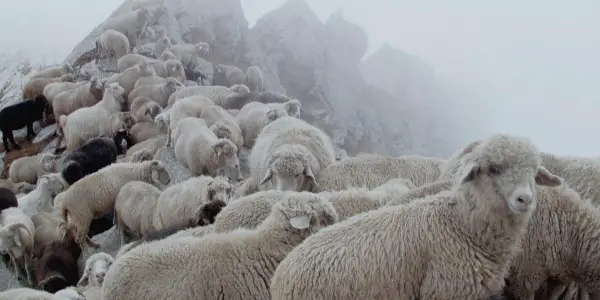
Somewhere in the Himalayas, an old shepherd and his servant take care of their many goats and sheep. When a plane crashes in the realms of a sacred mountain, the two men find themselves thinking about salvaging what they can from the wreckage to enrich their lives, just like the numerous success stories they heard about. Ignoring any ill-fated omens that may have danced before his eyes, the shepherd finds himself making a trek in search of the crash, but finds that his journey isn’t so simple.
We clearly understand the actions and attitudes of the shepherd and his assistant, with the former finally realising that the trap of his systematic life has left him brittle and weak, while the former is finds himself a reluctant slave to responsibility and wants to break free of the old man’s hold.
Director and co-writer Ridham Janve cleverly illustrates a great deal of ambiguity surrounding the “magical realism” and “supernatural” aspects of the story, thereby leaving it up to the viewer to decide as to whether things are as they seem and whether the choices made are directly linked to the consequences. With the land dominated by villagers’ fears of the great serpent god known as the Naga, many believe that venturing to the holy mountains will mean death or disappearance. We never know whether or not the Naga is at play, but we fear for the livestock that are helpless when unguided (as a unit, the animals become just as prominent as the shepherd and his assistant).
The beautifully misty and snow-capped mountains and forests are captured in a way that boast a sense of awe and majesty, while also exhibiting an ominous sense of mystery. The music plays out more as a spiritual memory or a trick of the region’s mystique rather than one that drives the action forward. The sound design steals the show with its unpredictable nature, going from menacing and unsettling to eerily quiet save for the soft echoes of footsteps. There is a rather terrifying scene involving the animals, where we are made aware of the presence of a strange creature, and it is down to how sound influences our imagination that we end up painting a frightening picture for ourselves.
Janve’s film is a great exploration into the concepts of fate and free will, with both of the men trying to fulfill their own idea of destiny. It is a timeless film that utilises the full potential of the cinematic medium, preferring to use as little dialogue as possible and focus on storytelling made up of action, expressions, gestures and sound.
Martin Eden (Pietro Marcello)
Gus Edgar-Chan: Adapted from Jack London’s 1909 novel of the same name, Pietro Marcello’s Martin Eden teleports the young proletarian at its centre from 20th century Oakland to who-knows-when Naples. Luca Marinelli is Martin – a hulking, brazen womaniser who, after crossing paths with the educated, well-mannered and altogether richer Elena (Jessica Cressy), leaves his life as a sailor behind to become a writer.

Wading through class struggle and talk of political upheaval, Martin attempts to ascend the social ladder without stooping to an individualistic mentality, reckoning the personal experiences conveyed in his literature with the naive optimism the mass would rather spend their time reading. In a sense, this conflict in approach and eventual stylistic shift mirrors the history of Italian cinema, as the fascist propaganda and heavily censored comedies of the pre-war 1930s segued into the working-class focused neorealism of films such as Bicycle Thieves and Umberto D.
And Marcello makes clear that cinema and history is at his film’s heart, swathing a textured Italy in sepia hues and marrying the narrative to archival footage steeped in memory and (broad) symbolism. This is not to say that Martin Eden forms a bridge between these two eras—the film is very careful to displace its hero’s journey from any definitive era, smooshing opposing period signifiers together and revelling in anachronistic details.
Yet it’s difficult to discern the reason for that approach: by dislodging the setting from any specific time period, Marcello removes the sting from the sociopolitical commentary Martin Eden didactically stumbles towards. The displacement is distracting rather than meaningful, the political resonance vague rather than pointed. In turn, the film’s overly-academic script becomes all the more impenetrable.
Martin Eden is at its best when functioning as a collage of sorts, smacking vibrant Italian pop with sequences of struggle, in the same vein as Antonio Pietrangeli’s 1965 film I Knew Her Well. Yet while that film combines an intense tragic irony with genuine empathy to substantiate its central figure’s plight, Martin Eden does little to coherently contrast its protagonist’s inherent brattishness. As he roams through a grainy nowhereland, it’s Marcello who gets lost along the way.
Rare Beasts (Billie Piper)
Becky Kukla: For beloved British actor Billie Piper’s directorial debut, Rare Beasts couldn’t be a more interesting piece to dissect. Bold and bolshy, but not quite as cohesive as it could be, Piper’s film depicts the life of Mandy; a single mother living in London, holding down a career, two fighting parents and a love life which seems hell bent on destroying her. Mandy is (there’s no two ways about it) a hot mess. She seems to float through life with little clarity on what she really wants or what motivates her. Her son, Larch, is difficult to say the least and at work she is dominated by a male heavy boardroom who dismiss any creative ideas that even lean slightly towards depicting women as real life people. As she embarks on a relationship with a truly diabolical specimen of a man, Mandy seems to become less and less anchored to anything remotely resembling something that she actually wants.

Rare Beasts has a wonderfully strong start – Piper’s Mandy is out on a date with a man who seems to be the living embodiment of the MRA Reddit forum. She’s stoned, he’s awful – the quips come thick and fast. The date doesn’t end well – or perhaps it does – with him (Pete, played by Leo Bill) chasing after her in a taxi, only to realise he can’t keep up. Rare Beasts continues on with this edgy, post-feminist humour (why does she carry on with Pete?) as Mandy battles all the things life throws at her.
Stylistically, Rare Beasts doesn’t shy away from a heady mix of bold lighting choices, extreme close ups and more than a few interesting editing choices. It certainly doesn’t feel like a safe or conventional film, seeming to exist in the confused space inside Mandy’s head whilst it works out exactly what it wants to be, as Mandy works out exactly what she wants. It’s a brave choice for a directorial debut not to err on the side of caution and whilst some of the cuts and shots are quite jarring, the film feels like it is doing something quite radically different. In all honesty, it’s refreshing to see something so striking, even when it doesn’t quite work.
Narratively though, Rare Beasts reads like a collection of amusing sketches that comment on gender, feminism, masculinity and religion. There are some laugh out loud moments (Mandy trying to force Larch to get in a taxi), some rather extraordinary scenes with emotional highs (the entire wedding dance scene for example) and a wonderfully absurd tap-dancing segment. Yet, when it comes down to it, that is all that Rare Beasts consists of – a series of funny, enjoyable, emotional scenes that feel like they are all taken from very different films. There is little in the way of a thread which binds these ‘moments’ together and therefore the film ends up feeling rather disjointed, and disappointing. On the other hand, Mandy is a severely disjointed person and the film does reflect this, even if the end result is disjointed.
Having said that, it will be very interesting to see what Piper embarks on next – Rare Beasts shows more than a little eye for stylistic flair for Piper as a director and with a tighter script, her next film could really shine.
Scales (Shahad Ameen)
Faisal Al-Jadir: In the dark of night, an ancient ritual rooted in superstition and fear unfolds in a fishing village seemingly cut off from the rest of the world. Walking past menacing rocky structures, men carrying fiery torches take their baby girls to the water, whom they will sacrifice to appease the mysterious, supernatural entity that they believe poses a great threat. As their chants fill the dark shores and murky depths, the men prepare to drown their young.
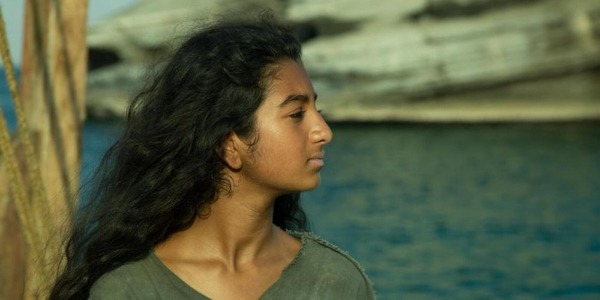
Defying tradition, one of them, Muthana (Yagoub Alfarhan), saves his own daughter before she can be forever lost. Twelve years later, the girl, Hayat (Basima Hajjar), and Muthana, are the black sheep of the village. Her father’s noble deed in choosing love over the community has physically marked her for life, with scaly skin coating a part of her flesh. Knowing that the ritual will be performed again soon, Hayat decides to confront and challenge the patriarchal authority and try to change both her standing and the village’s general attitude.
Expanding on the framework of her brilliant 2013 short, Eye & Mermaid, director and writer Shahad Ameen paints an ambitious canvas of a land that creates its own walls and borders, ones that are not seen but are yet enforced. A strong feminist spirit flows through the film’s infrastructure, playing with commentary on Arab tradition and the backwards treatment of females in certain countries. The men in the village fear the mythical “Sea Maiden”, and in turn hunt the creatures that they neither know or understand. They use such logic to their women and resort to dehumanising them and halting their personal growth.
Ameen challenges gender roles and politics, and gives her protagonist, Hayat (whose name means “life” in Arabic), the confidence to adopt the masculinity of her naysayers and prove that she is more than capable of being a leader and a protector. Drawing on folk tales, mythology, poetry, religion and spirituality, Ameen uses fable and fantasy to explore themes of prejudice and xenophobia, making her film a politically-charged genre companion to the works of Nadine Labaki and AnneMarie Jacir.
Even with the passage of time, Shahad Amen’s Scales may very well exist in its own abstract reality, where the sea is infinite and nothing else lies in the beyond; a hidden dimension that has created its own definition of space and time, and isn’t delegated to any past, present or future.
The film is a great technical achievement, with stunning use of black & white photography that plays with the shadowy nature of the village and its shores, and the brightness of the day that feels cynical rather than promising. Photographed to show a sense of scope, the characters are also dwarfed by their island, the rocks and the sea, playing with the idea that they are lost in their own prison and blindly worship old laws and structures. The sound design is so effectively realised that we feel the fury of the tide and waves, and are haunted by the wailings of mermaids and sirens.
Scales shows us that we should never fear who we are or what others may think of us, but rather use our “flaws” to incite change when they won’t.
A White White Day (Hlynur Palmason)
Becky Kukla: A portrait of grief and despair, A White White Day depicts the descent into madness of a widower after discovering that his recently deceased wife may have been having an affair. Set in rural Iceland, the rugged and desolate landscape provides an essential backdrop for this story of one man’s spiral into a state he may not be able to return from.
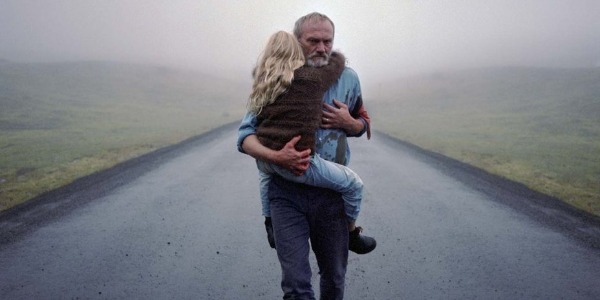
Director Hlynur Palmason directs his second feature with expert control over the atmosphere and tension – two fundamentally important reasons why the film works so well. Though it’s runtime feels slightly long (there are several moments of introspection which feel very drawn out), the relatively simple narrative is woven around the eerie journey that protagonist Ingimundur makes in his mind and in his small rural community. Much of the film is spent out on the craggy Icelandic roads which run alongside dangerous cliff edges against imposing mountains. Considering the catalyst for the film is Ingimundur’s wife’s death on these treacherous roads (a haunting opening scene), every time Ingimundur is in the car followed by floating camera, it feels incredibly poignant despite little action occurring.
The dissection of Ingimundur’s inability to discuss his growing anger leads directly to the multiple fits of anger and rage interspersed in between elongated moments of stillness that make up the rest of the film. The majority of A White, White Day occurs in a state of near silence as he slowly discovers the extent of his wife’s betrayal. The puncturing of this quiet melancholy is shocking, but fully encompasses Ingimundur’s complicated relationship with his grief. A scene in the latter half of the film involving a therapy session conducted via webcam is particularly endemic of his grief and anger bubbling over, followed almost immediately by his complete and utter breakdown.
Standout performances are from Ingvar Sigurdsson as Ingimundur, and the young Ída Mekkín Hlynsdóttir as his granddaughter Salka. Relationships with Ingimundur’s other family members (including Salka’s mother) stay constantly on the periphery as Salka is the only person he can seem to connect with. This is problematic in itself – at times Ingimundur seems to be replacing his emotional connection to his deceased wife with the relationship with Salka, which is far too much to put on such a young girl. Sigurdsson and Hlynsdóttir encompass these complexities on-screen perfectly, even more so as they spend much of the film in relative silence communicating through body language only. A relatable and at times shocking depiction of grief, and a unique film, A White, White Day definitely deserves to be seen widely.
Thanks once again for reading our LFF coverage – and stay tuned to Film Inquiry for more reviews from the world’s biggest festivals all year round.
Does content like this matter to you?
Become a Member and support film journalism. Unlock access to all of Film Inquiry`s great articles. Join a community of like-minded readers who are passionate about cinema - get access to our private members Network, give back to independent filmmakers, and more.
Alistair is a 25 year old writer based in Cambridge. He has been writing about film since the start of 2014, and in addition to Film Inquiry, regularly contributes to Gay Essential and The Digital Fix, with additional bylines in Film Stories, the BFI and Vague Visages. Because of his work for Film Inquiry, he is a recognised member of GALECA, the Gay & Lesbian Entertainment Critics' Association.










